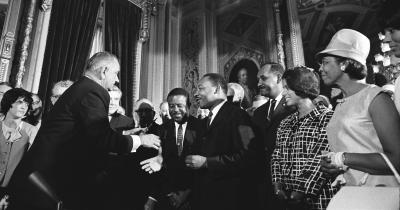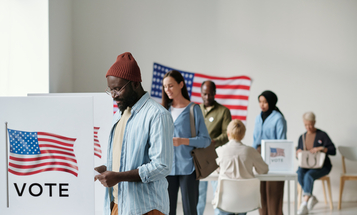
Still Fighting for Voting Rights 57 Years after the VRA
Fifty-seven years ago today, the Voting Rights Act became law. Today we find our democracy regressed in a moment eerily similar to that turning point in 1965.

Fifty-seven years ago today, the Voting Rights Act (VRA) became law. It was one of the most effective racial justice statutes in American history—and technically it never should have been needed.
The right for Black men to vote was enshrined in the Constitution in 1870, and the right for (some) women to vote in 1920, by the 15th and 19th Amendments, respectively. Yet Southern states continued to find cruel and creative ways to halt Black democratic participation by banning Black people from the ballot through decades of voter suppression and violent racist terrorism we know as Jim Crow.
To tell the story, the VRA almost didn’t pass, due in part to the filibuster used by some U.S. senators as an attempt to entrench white minority rule.
To tell the story, the VRA almost didn’t pass, due in part to the filibuster used by some U.S. senators as an attempt to entrench white minority rule. But we can thank the courageous, persistent, and powerful organizing and advocacy of the Civil Rights Movement and political allies for ensuring the Voting Rights Act became law.
Today we find our democracy regressed into a moment eerily similar to that turning point in 1965.
The 2013 Shelby v. Holder decision, where a 5-4 majority of the Supreme Court gutted a core VRA provision which protected voting rights in states with a history of discrimination, ushered in the resurgence of state-level anti-voter laws. Last year alone, 18 states passed 34 laws designed to make it harder to vote and often in ways that blatantly undermine voting access for Black and brown people.
This emboldened revival of voter discrimination facilitated by the Supreme Court and anti-democratic policymakers has the effect of shifting power away from Black and brown communities, and it is only possible because the VRA’s key elements have been significantly undermined in the decades since its passage.
In Florida, lawmakers enacted legislation, SB 90, that would have limited the use of drop boxes, punished groups for handing out water to people waiting in line to vote, and put roadblocks in the way of voter registration drives, among other restrictions. Civic and voting rights groups—including Equal Ground Education Fund, Florida Rising Together, Hispanic Federation, Poder Latinx, and Unidos US —recently won a lawsuit to block SB 90. The court struck down certain provisions of the law as unconstitutional and in violation of the Voting Rights Act, finding that in passing SB 90, Florida exercised intentional racial discrimination. (Florida is now appealing the ruling.)
And today, as in 1965, willing federal lawmakers who would restore voting rights protections face a formidable obstacle: that living relic of Jim Crow, the filibuster.
And today, as in 1965, willing federal lawmakers who would restore voting rights protections face a formidable obstacle: that living relic of Jim Crow, the filibuster.
The filibuster imposes white minority rule by ensuring that legislation requires a supermajority of 60 votes in the Senate to gain passage. Senators used this tool to block anti-slavery legislation. They used it in the 1940s to block anti-poll tax legislation. In 2022, Republican senators used it to block the Freedom to Vote: John R. Lewis Act despite the policy’s pro-voter, pro-democratic policies and public support from 63 percent of all likely voters. The bill’s national standards on automatic and same-day voter registration, expansion of voting by mail, baselines for the number of early voting days, safeguards against partisan gerrymandering, and more were the next frontier for bolstering the VRA. These provisions are still needed today more than ever.
Across the country, people are fighting as they did in Florida to preserve and expand voting rights. Federal policymakers have similarly taken steps to advance and enforce national policies that protect and strengthen our democracy. Much like the vision of the National Voter Registration Act of 1993 (NVRA), President Biden’s Executive Order Promoting Access to Voting calls on federal agencies to provide voter registration to the people they serve. Robust implementation of this EO could break down barriers to registration for millions of eligible voters. This holds great promise, but there is more we must do.
So let this anniversary of the Voting Rights Act be a moment of reflection and a call to action.
So let this anniversary of the Voting Rights Act be a moment of reflection and a call to action. Let’s seize this moment to build power for our communities. We’re at a crossroads again as a country, and it will take a power shift to defeat anti-democratic agendas delivered, in part, by an illegitimate Supreme Court majority and a rising white supremacist movement.
Working alongside the grassroots and other leaders who are engaging in fights across the country to shift power, Demos is proud to stand up against all that stands in the way of the just, inclusive democracy that should be ours.




